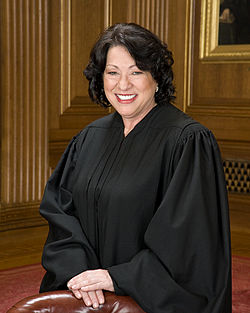
Sarah Palin decided to weigh in again on the healthcare debate Wednesday, penning an
editorial for the Wall Street Journal that is almost certainly an early step in her campaign for the Republican presidential nomination. The short column is notably more civil than her fiery and woefully inaccurate Facebook postings and seeks to cast Palin as a thoughtul and compassionate polemic responding to President Obama's previous
op-ed in the New York Times. This tactic is to be applauded and it would be a welcome (and productive) change if more politicians and interested members of the public would express themselves in this way. Beyond appreciation for the chosen method of conveying ideas, however, it is hard to take Palin's editorial seriously as it still suffers from an overreliance on personal ideology and a lack of astute argument.
The obvious appeals to the conservative base (by way of tributes to Ronald Reagan and the Cato Institute) aside, Palin's piece actually does a good job of organizing and presenting her arguments against the current proposals to reform healthcare. The editorial also raises a very valid point, namely that the Democratic proposals in Congress have been unable to overcome large price tags and dismal forecasts from the Congressional Budget Office (CBO). Unfortunately, this singular criticism is the full extent of the possible contribution of the column; the remaining portion displays a lack of specificity, practicality, and veracity.
For instance, Palin begins her argument in earnest with the following:
"Common sense tells us that the government's attempts to solve large problems more often create new ones. Common sense also tells us that a top-down, one-size-fits-all plan will not improve the workings of a nationwide health-care system that accounts for one-sixth of our economy. And common sense tells us to be skeptical when President Obama promises that the Democrats' proposals 'will provide more stability and security to every American.'"
There are two clear fallacies in this excerpt that prevent it from having much informative value to a concerned reader. First, the repeated reference to "common sense" -- while charming and colloquial -- is erroneous and misleading. It would be more appropriate to substitute "conservative principles" since these statements express ideas that Republicans hold to be true (and perhaps even self-evident) rather than truths that are almost universally recognized -- that which would normally be termed common sense. Labeling the above assertions in this way is as ingenuous as it would be for a liberal author to write, "Common sense tells us that closer regulation of the market is vital to our economy." Many reasonable individuals could and have reached different conclusions from the ones Palin offers, and her stab at cloaking them in the guise of common sense is a regrettable attempt to make it appear as though her ideas have near universal support.
The second fallacy is the infamous "straw man" argument. Since it is quite straightforward, there is no need to spend much time dissecting it. Suffice it to say that it is an unfair characterization to say that Democrats are advocating for "a top-down, one-size-fits-all plan." Though one may disagree with the current proposals in Congress, this is an oversimplication and belittles the genuine efforts that have been put forth by both parties.
Palin also uses sweeping language that is reminiscent of her campaign slogans:
"With all due respect, Americans are used to this kind of sweeping promise from Washington [referring to the promise to 'provide more stability and security to every American']. And we know from long experience that it's a promise Washington can't keep."
Statements like this are curious. It is perfectly appropriate to criticize elected officials and the legislature for what one sees as failed or forgotten promises, but off-the-cuff remarks like these go further and seem to express disbelief that a government can ever live up to the promises it makes or have a significant and positive impact on its citizens. It is surprising that such a cynical and pessimistic view would be held by someone who -- interestingly enough -- wishes to lead that same government.
Next, there is the renewal of one of Palin's more unfortunate and ridiculous claims:
"Given such statements, is it any wonder that many of the sick and elderly are concerned that the Democrats' proposals will ultimately lead to rationing of their health care by—dare I say it—death panels? Establishment voices dismissed that phrase, but it rang true for many Americans. [...] But the fact remains that the Democrats' proposals would still empower unelected bureaucrats to make decisions affecting life or death health-care matters. Such government overreaching is what we've come to expect from this administration."
To avoid wasting time (again) on this buffoonery, the reader is referred to
FactCheck.org for a treatment of this subject. Here it is only important to note that Palin (who started the furor by introducing and popularizing the myth of "death panels") attempts to attribute the controversy to the concern of the American people. The remark about "unelected bureaucrats" making "life-or-death" decisions could perhaps have a ring of truth, as inefficiency and mishandling of important matters can be a very real obstacle to overcome. Yet there is no proof offered to suggest that the current system -- in which unelected businessmen charged with making profits and minimizing losses make these same decisions -- is any more palatable.
Palin also says:
" [...] President Obama argues in his op-ed that Democrats' proposals "will provide every American with some basic consumer protections that will finally hold insurance companies accountable." Of course consumer protection sounds like a good idea. And it's true that insurance companies can be unaccountable and unresponsive institutions—much like the federal government. That similarity makes this shift in focus seem like nothing more than an attempt to deflect attention away from the details of the Democrats' proposals [...] "
"With all due respect," it seems nothing short of hypocrisy to make such an accusation when this passage deflects in precisely the same manner. Indeed, the topical shift is so pronounced that it is difficult to see what other purpose this paragraph could serve.
Finally, Palin sums up her argument by saying:
"Instead of poll-driven 'solutions,' let's talk about real health-care reform: market-oriented, patient-centered, and result-driven."
It is far from unreasonable to argue that healthcare reform should not be purely driven by "polls;" many of the the issues involved are extraordinarily complex and require significant administrative and medical expertise to approach correctly. To deny all influence of polls or elections, however, would be to completely elimuinate any form of popular input. While public opinion should be tempered by expert knowledge, it certainly should not be ignored.
It is also incredibly difficult to see how one might reconcile the ideas that Palin puts forth. Labels such as "patient-centered" and "result-driven" obviously sound appealing, but in practice they are often in conflict with "market-oriented" strategies. This is, possibly, one of the most important issues in the healthcare debate -- it is also completely glossed over by Palin's op-ed. If a healthcare provider is to be operated like a business, its goals tend to favor the continued existence and profitability of the provider. If a healthcare provider is "patient-centered" and "result-driven," then the goals of that provider are likely to focus less on economic concerns and more on the needs of the sick individual. Almost all politicians would agree that the second options sounds better. The complication is that cost and risk are likely to serve to very different functions in the schema of these two companies, and it is very difficult to see how a provider could have both the patient's concerns and its own profitability as a primary goal. Palin's column fails to offer any guidance -- it simply says that healthcare should somehow accomplish both.
The end of the editorial simply lists ideas that have come from other conservative sources without explaining how they are helpful or why they are preferable to the current proposals. It may be that they are, in fact, more likely to achieve beneficial reform, but the reader cannot accept their superiority without some legitimate proof. In sum, while it is encouraging to see the beginning of a public (and civil) exchange of words and ideas, Palin's contribution seems to be more an homage to the conservative platform -- and the start of a campaign -- than a true launching pad for successful reform. It could, however, provoke successful and measured debate.



